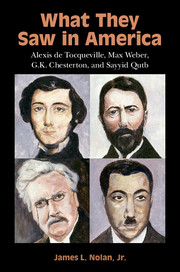Book contents
- Frontmatter
- Dedication
- Contents
- Acknowledgments
- Introduction
- 1 Pride, Patriotism, and the Mercantilist Spirit: Tocqueville and Beaumont Discover America
- 2 Tocqueville and the Quandary of American Democracy
- 3 Agrarianism, Race, and the End of Romanticism: Weber in Early Twentieth-Century America
- 4 Weber on Sects, Schools, and the Spirit of Capitalism
- 5 A New Martin Chuzzlewit: Chesterton on Main Street
- 6 Chestertonian Distributism and the Democratic Ideal
- 7 From Musha to New York: Qutb Encounters American Jahiliyya
- 8 Qutb's “Inquiring Eyes” in Colorado and California
- Conclusion
- Notes
- References
- Index
1 - Pride, Patriotism, and the Mercantilist Spirit: Tocqueville and Beaumont Discover America
Published online by Cambridge University Press: 05 April 2016
- Frontmatter
- Dedication
- Contents
- Acknowledgments
- Introduction
- 1 Pride, Patriotism, and the Mercantilist Spirit: Tocqueville and Beaumont Discover America
- 2 Tocqueville and the Quandary of American Democracy
- 3 Agrarianism, Race, and the End of Romanticism: Weber in Early Twentieth-Century America
- 4 Weber on Sects, Schools, and the Spirit of Capitalism
- 5 A New Martin Chuzzlewit: Chesterton on Main Street
- 6 Chestertonian Distributism and the Democratic Ideal
- 7 From Musha to New York: Qutb Encounters American Jahiliyya
- 8 Qutb's “Inquiring Eyes” in Colorado and California
- Conclusion
- Notes
- References
- Index
Summary
On April 2, 1831, two young French aristocrats, Alexis de Tocqueville and Gustave de Beaumont, departed from the Normandy town of Le Havre, on a ship bearing the same name, destined for New York City. They were, respectively, only twenty-five and twenty-nine years old at the time. Their ostensible reason for traveling to the United States was to study American penitentiaries, consider which features of these penal institutions might be transferable to France, and report on their findings to the new Orléans government of King Louis Philippe I. Though they would be faithful in their commission to study American prisons, this justification for the trip was merely a pretense. They had ulterior motives, both with respect to their reasons for leaving France and for what they wished to see in America.
Tocqueville and Beaumont came from noble families loyal to the Bourbon dynasty. Neither Tocqueville's nor Beaumont's families elected to emigrate from France following the 1789 Revolution. Consequently, Tocqueville's parents, Hervé and Louise, were imprisoned for ten months during the Reign of Terror, and were only spared the guillotine as a consequence of Robespierre's fall on July 27, 1794. Louise's parents, grandparents, and other family members had been executed just days earlier. Though spared the scaffold, Hervé and Louise de Tocqueville were deeply affected by their time in prison; Hervé's hair turned entirely white during his captivity (though he was only twenty-one years old) and Louise suffered from fragile nerves and a sort of nostalgic melancholy thereafter. The family, which was able to recover a sizeable portion of their estates (on both sides of the family), eventually settled in Verneuil, a family chateau about 18 miles northwest of Paris, where Tocqueville (born in 1805) and his two older brothers, Hippolyte and Édouard, spent their early childhood.
Verneuil provided a relatively tranquil setting for the Tocqueville family, in spite of France's tumultuous political situation. Despite the shifting political tides, Hervé de Tocqueville succeeded in public life, first as the mayor of Verneuil during Napoleon's rule, and then as a prefect under Charles X, whose 1824 ascendance to the throne marked the return to power of the Bourbons. This stability amidst the storm was also aided, in part, by the presence of Abbé Lesueur, a Catholic priest who lived with the Tocquevilles following the revolution and who served as a kindly tutor for the three Tocqueville sons.
- Type
- Chapter
- Information
- What They Saw in AmericaAlexis de Tocqueville, Max Weber, G. K. Chesterton, and Sayyid Qutb, pp. 11 - 35Publisher: Cambridge University PressPrint publication year: 2016



